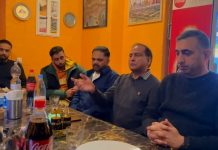Thursday, February 19, 2026
More
Germany searched on Monday for answers on possible security lapses after a man drove his car into a Christmas market, killing at least five people and casting a renewed spotlight on security and immigration ahead of a snap election.
The possible motive of the arrested suspect, a 50-year-old psychiatrist from Saudi Arabia with a history of anti-Islamic rhetoric and a sympathy for the far-right Alternative for Germany (AfD) party, remains unknown.
Advertisement · Scroll to continue
The man, identified only as Taleb A., had left video messages on his social media X account on the day of the attack.
In rambling commentary, he variously blamed Germany’s supposed liberalism for the death of Socrates, an ancient Greek philosopher, and accused police of stealing a USB stick from him and destroying a criminal complaint he had filed.
The Welt newspaper said he had undergone psychological treatment.
As a nation mourned, with citizens leaving flowers and lighting candles in Magdeburg where the incident took place on Friday, questions swirled about whether more could have been done and whether the authorities could have acted on warnings.
Federal Interior Minister Nancy Faeser called for tougher internal security laws to be adopted, including a new act to strengthen police forces as well as the introduction of biometric surveillance.
“It is clear that we must do everything to protect the people of Germany from such horrific acts of violence. To do this, our security authorities need all the necessary powers and more personnel,” Faeser told Spiegel news magazine.
The deputy head of a security committee in the Bundestag (parliament) announced he would convene a special session asking why previous warnings about the danger posed by Taleb A. were not acted upon. Taleb A. has lived in Germany since 2006.
The attack occurred two months before a snap election in February where the anti-immigration AfD is polling in second place and is particularly strong in eastern Germany, where Magdeburg is located.
“I’ll put it this way: everyone deals with this situation in their own way, some are grieving, others are angry,” said Andreas Bohs, who was passing the Magdeburg attack site where mourners laid flowers, candles, teddies and other stuffed toys.
“Everyone has the right to express their opinion and this should not be used for any political purposes here. But I know that every political party somehow does it.”
AfD leaders planned to stage an event in Magdeburg on Monday evening.
“The discussion about new security laws must not distract from the fact that #Magdeburg would not have been possible without uncontrolled immigration,” AfD leader Alice Weidel wrote on social media. “The state must protect citizens through a restrictive migration policy and consistent deportations!”
Also on Monday evening, an initiative organised under the motto “Don’t give hate a chance” is calling for a human chain to be formed in Magdeburg.
A local hospital said it was still treating 72 injured people, of which 15 were in severe condition.
Germany’s main opposition Christian Democratic Union, which polls indicate will form the next government, called for the strengthening of intelligence services.
Holger Muench, president of the federal criminal police office (BKA), told public broadcaster ZDF at the weekend that Germany was reviewing security measures at Christmas markets and addressing any vulnerabilities.
Muench said Germany had received a warning from Saudi Arabia as far back as 2023 about the suspect, which German authorities investigated but found vague.
“The man also published a huge number of posts on the Internet. He also had various contacts with the authorities, made insults and even threats. But he was not known for acts of violence,” Muench said.
Taha al-Hajji, a Saudi lawyer in exile and the legal director for the Berlin-based European-Saudi Organisation for Human Rights (ESOHR), said most Saudi opposition activists did not have a good relationship with the suspect.
“He made problems with everyone always … He was really isolated,” said al-Hajji.
“He felt that he was the only one right and people were wrong, he felt he was the centre of everything, he was important. He always had problems with everyone.”
© London Post, All Rights Reserved by Independent Media Group UK Limited.





